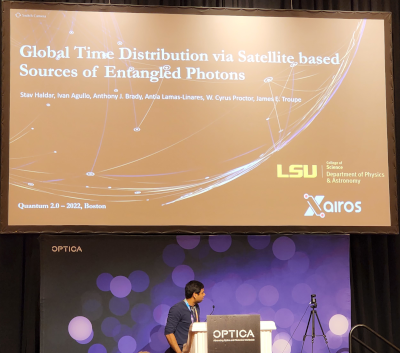
 David Mitlyng for Xairos
David Mitlyng for Xairos
Frozen in Time
When GPS was first made available to the commercial world it offered a timing accuracy of 40 nanoseconds.
This timing accuracy enabled early 4G LTE networks.
Now, twenty years later, the timing accuracy has improved slightly to 30 nanoseconds.
This is barely adequate for 5G networks.
And it comes with a caveat: "This performance standard assumes the use of a specialized time transfer receiver at a fixed location." (Note: specialized = expensive).
But 6G networks, efficient data centers, and quantum networks need better timing accuracy.
Unfortunately, there are no plans to improve GPS beyond 30 nanoseconds.
A new solution is needed.
Last Week's Theme: "Assume You can be Jammed"
- Following up from meetings at Quantum.Tech Boston and Quantum 2.0 in Boston last week.
- Great job Stav Haldar from Louisiana State University (LSU), giving a presentation on "Global Precision Time Distribution via Satellite-Based Entangled Photon Sources"

- Joining a Catalyst Government Boot Camp Panel of Peers, a group of fellow Catalyst Accelerator alumni sharing their experience working with the US Government.
- Also speaking at the GlobalMindED Conference this week. The goal of the conference is "to improve access to education, employment, and economic mobility for First Gen college students, poverty-affected, and minoritized students hardest hit by COVID the last two years."
- Working to expand the team and add Quantum and Timing experts to our Board of Advisors.
- Progress on the proof-of-concept (POC) hardware development continues!
- Developing a research partnership with a university quantum research lab, as well as commercial partnerships.
- How easy is it to jam a GPS signal? Very. And if you ever wanted to spoof (alter) the GPS time signal, here’s your instructional video from the same group that explains how to detect GPS spoofing.
- Chinese automaker Geely launched the first nine satellites of a 240-satellite position, navigation, and timing (PNT) constellation called the Geely Future Mobility Constellation. It is designed to "provide centimetre accurate precise positioning and connectivity support for use by automotive brands in the Geely Holding portfolio, enabling true, safe autonomous driving."
- The Heritage Foundation released a report “Meeting China’s Space Challenge” reviewing the Chinese five year plan for a “Space Silk Road” outlined in “China’s Space Program: A 2021 Perspective.”
- Two US Senators have introduced the “American Technology Leadership Act of 2022” with the intent of establishing an “Office of Global Competition Analysis.”
- A massive solar flare sideswiped Earth last week, raising concerns that a direct hit could lead to an “internet apocalypse.”
- So what happens if GPS goes dark? The Pentagon is working on it - but only for the military.
- The Chicago Quantum network, one of America’s first publicly-available testbeds for quantum security technology, announced it has nearly doubled to six nodes and 200 kilometers of optical fiber. Meanwhile, Quebec’s technology incubator Numana announced “the launch of a state-of-the-art quantum communications infrastructure to implement open networks for industry and researchers.”
- There is a lot of misinformation around quantum computers and their applications, but you can trust Los Alamos National Labs (LANL) “Quantum Algorithm Implementations for Beginners” paper.
- Quantum Information Science International Workshop, July 12-14, Rome, NY
- Small Satellite Conference, August 6 - 11, Logan, Utah
- Optics + Photonics, August 21 - 25, San Diego, CA
- ION GNSS+ 2022, September 19 - 23, Denver, CO
- IEEE Quantum Week 2022, September 18 - 23, Broomfield, CO
- APSCC 2022, October 18 - 20, Seoul, Korea
- Tough Tech Summit, October 27 - 28, Boston, MA
- International Timing and Sync Forum, November 7 - 10, Dusseldorf, Germany
The Ukraine conflict has highlighted the value of commercial satellite communications.
“In the hours before the invasion began on February 24, Moscow launched "AcidRain" against Viasat… a "wiper" designed to target Viasat modems and routers and erase their data before permanently disabling them.”
Their expectation was that this cyber attack would wipe out the last of Ukraine's communications.
But they did not count on the resiliency of Starlink and other commercial satellite operators.
“Ukrainians' access to Starlink has "totally destroyed" Russian President Vladimir Putin's information campaign,” asserts Brig. Gen. Steve Butow from Defense Innovation Unit (DIU).
This success has caught the notice of US officials.
But China is also paying close attention.
Chinese researchers recently published a paper describing ways to “disable or destroy SpaceX’s Starlink satellites if they threaten national security.”
They are also working hard to build up their own space capabilities.
A recent workshop led by the US Air Force, DIU, US Space Force, and NASA concluded that “China is on track to surpass the U.S. as the dominant space power as early as 2032,” and “has already surpassed the U.S. in some key areas closely related to space, e.g. quantum, hypersonics.”
To learn more, please email us or schedule a meeting here.

